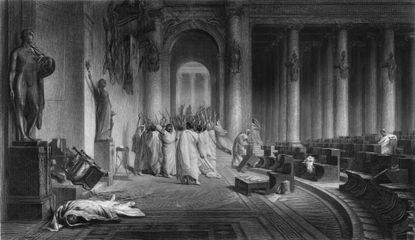Trump as Caesar
How the Public Theater's controversial adaptation of Shakespeare's drama captures the desperation and despair of the Trump presidency


In 2012, the Acting Company and the Guthrie Theater in Minneapolis mounted a production of Shakespeare's play, Julius Caesar set in the (then) present day, with an African-American actor playing Caesar in a manner clearly intended to evoke President Barack Obama, and the conspirators clearly intended to recall leading Republican legislators like Eric Cantor and Mitch McConnell. Now, for a few days, in the face of conservative outrage and the abandonment by key corporate sponsors, New Yorkers can go to Central Park to see the Public Theater's production of that same Roman tragedy, this time with an even more on-the-nose stand-in for President Donald Trump as the titular would-be dictator.
You probably think I'm going to point out the hypocrisy of the outrage that has greeted the current production versus the indifference (far more typical for the theater) with which the production from five years ago was met. Or perhaps you think I'm going to do the opposite, and point out that with the victims of a politically-motivated mass shooting in Arlington still being treated for their wounds, now is emphatically not the time to be play-acting the murder of the president.
But the play's the thing that might actually catch our conscience. So that's what I'm interested in.
Subscribe to The Week
Escape your echo chamber. Get the facts behind the news, plus analysis from multiple perspectives.

Sign up for The Week's Free Newsletters
From our morning news briefing to a weekly Good News Newsletter, get the best of The Week delivered directly to your inbox.
From our morning news briefing to a weekly Good News Newsletter, get the best of The Week delivered directly to your inbox.
What was most interesting about the Obama-era Caesar was that it took the ideas of the conspirators seriously — because those small-r republican ideas have a legacy with considerable importance in American history. Some of the heirs to that history — like Patrick "give me liberty or give me death" Henry — we still honor. Others — like the actor John Wilkes Booth, who quoted Brutus when he killed President Lincoln — we abhor. A production that situated the Tea Party's rage against Obama within the context of that history had the potential to bring out important insights about that political moment, a potential that was substantially realized in that production.
How well does this new production of Julius Caesar measure up to that standard?
On the evidence of what I saw on Tuesday night, director Oskar Eustis is not so interested in the ideas behind the play as he is in the passions of the moment. But in exploring those passions, he digs up some uncomfortable truths about the much-sloganed "resistance" to the Trump regime — and sheds surprising light on the play itself.
The first shock of the evening is that it makes any sense at all to hear Caesar's words coming out of Donald Trump's mouth. It's almost as disorienting as seeing Trump actually being the president. Shakespeare's Caesar has a firm sense of his own transcendent importance, the distance that separates him from even a noble Roman like Brutus. It is precisely this awesome majesty that incites Cassius' envy — he remembers that Caesar is but a man of flesh and blood, because he knew him before he was lord of all the world, and saw his frailty, and so he willfully refuses to accept his apotheosis.
Sign up for Today's Best Articles in your inbox
A free daily email with the biggest news stories of the day – and the best features from TheWeek.com
But put those same words in Trump's mouth, and no one — at least no one in a liberal New York audience — can hear Caesar the same way. What once was grand is now petty; what once was awesome is merely domineering. And we realize: The words only work if we feel the charisma of the man who utters them. This Caesar (played with broad humor by Gregg Henry) isn't even much of a tyrant — he's a shallow, vain, petulant man-child, strutting about, and embarrassing the senators even as the prospect of his kingship terrifies them.
This works shockingly well, for all but Brutus' famous soliloquy in which he convinces himself to kill the tyrant. Corey Stoll does a masterful job in the part, giving Brutus a warmth I've rarely found in the clockwork conspirator, but the speech only works if you ignore the words, which are all about Caesar's ambition and a possible change in his character should he assume dictatorial powers, when we can all see that the problem is the character he already manifests.
The contours of the political forces arrayed against this Trumpian Caesar are a bit fuzzy. It is surely no accident that the vast majority of the conspirators are African-American, including John Douglas Thompson's Cassius and Teagle F. Bougere's Casca, inaccurate a cross-section as that is of the American Senate. On the other hand, I probably over-read the costume design when I noted that the conspirators who approach Brutus at the top of the play are all wearing blue ties, while Brutus, like Caesar, wears red, suggesting — logically, in terms of his role in the play — that Brutus is a turncoat Republican (and Corey Stoll does bear a mild resemblance to Evan McMullin).
Those ambiguities notwithstanding, the plausibility of the conspiracy, in emotional if not on practical terms, is the least shocking thing about the production. Trump, the conspiracy-monger-in-chief, has been the object of a prodigious industry of conspiratorial fantasy since before he even won the Republican nomination, from schemes to deny him a majority of the convention delegates, to dreams of faithless electors, to the current fantasy in which his own cabinet invokes the 25th Amendment and removes him for being unable to perform the duties of the office. Precisely because there is ample reason to be terrified of Trump in the Oval Office, pantomimes of assassination do not feel cathartic so much as desperate grasping at imaginary straws.
And it is precisely this feeling of desperation and despair that the production drives home most forcefully. There has been much talk, including from the Public Theater itself, that the production was intended as a warning of the dangers of trying to defend democracy by undemocratic means — which it is, but without the comfort of suggesting that there might have been a better way through. Because this Caesar makes it plain that the resistance never had a chance.
An almost universal problem with productions of Julius Caesar is the transition from conspiracy to civil war. This is a structural problem in the play, and it generally becomes more acute in modern-dress productions (unless they are set in modern-day Africa), because the prospect of such disorder is so remote. Eustis solves this problem by turning the conspirators' armies into a poorly-armed street rabble, and by putting the police on the side of Antony after the funeral oration (which deprives that oration of its apparent purpose of stirring up the populace to riot). The police even beat up poor Cinna the Poet. This is wildly contrary to the Roman situation — but it corresponds to the situation we actually face, in which the "resistance" to Trump has as few divisions as the Pope who Stalin famously dismissed.
A patently foredoomed rebellion turns out to be more dramatically effective than a war whose outcome appears to hinge as much on circumstance as anything. In Shakespeare, Brutus and Cassius played their hand as best they could, knowing they needed to draw an inside straight, and never found their card. In this production, Brutus' call to "take the current when it serves" is blackly comical, when all he has to command are a flood of protesters who are easily mown down by regime goons with machine guns. The conspiracy failed to achieve regime change not merely because it made this or that tactical error, but because of a wild misunderstanding of the correlation of forces.
The assassination, not merely as a play but within the world of the play, is a piece of theater first and foremost. And today's left, both mainstream and extreme, is rather enamored of the idea that theater is resistance, and theatrical violence is some of the most compelling theater. But that is all it is. The political terrorist who attempted to massacre a group of Republican congressmen and staffers playing baseball yesterday undoubtedly thought he was taking direct action to produce radical change. But he was just putting on a grisly show.
And what about the grisly show on stage? I suspect a lot of the people in the audience when I attended were there precisely to show Delta Airlines and Bank of America, who abandoned the play, that they would not be cowed, as well they should. But the production as such will do nothing to change the fate of Donald Trump's presidency. Its only real effect will be how it changes those who saw it in terms of their understanding of the real workings of power.
As for those who cry that it is irresponsible to depict the assassination of President Trump, I could reiterate, as my betters have already done, the manifold instances of such depictions in the past, and the litany of far more noble leaders who shrugged at the offense in much more dire circumstances. Instead, I will merely note that if there is one thing we should have learned from the rise of Donald Trump, it is that telling people there is something they cannot say, or think, or feel, is the surest way to give those feelings, thoughts, and words greater power, and those who voice them greater chance of achieving power, than they had had before.
Create an account with the same email registered to your subscription to unlock access.
Noah Millman is a screenwriter and filmmaker, a political columnist and a critic. From 2012 through 2017 he was a senior editor and featured blogger at The American Conservative. His work has also appeared in The New York Times Book Review, Politico, USA Today, The New Republic, The Weekly Standard, Foreign Policy, Modern Age, First Things, and the Jewish Review of Books, among other publications. Noah lives in Brooklyn with his wife and son.
-
 Solo travel: the 'ultimate indulgence in 2024'
Solo travel: the 'ultimate indulgence in 2024'The Week Recommends Why more of us are choosing to go on holiday on our own
By Adrienne Wyper, The Week UK Published
-
 'Stormy Monday for Don'
'Stormy Monday for Don'Today's Newspapers A roundup of the headlines from the US front pages
By The Week Staff Published
-
 6 queer poets to read whenever but especially now
6 queer poets to read whenever but especially nowThe Week Recommends April is National Poetry Month
By Scott Hocker, The Week US Published
-
 Arizona court reinstates 1864 abortion ban
Arizona court reinstates 1864 abortion banSpeed Read The law makes all abortions illegal in the state except to save the mother's life
By Rafi Schwartz, The Week US Published
-
 Trump, billions richer, is selling Bibles
Trump, billions richer, is selling BiblesSpeed Read The former president is hawking a $60 "God Bless the USA Bible"
By Peter Weber, The Week US Published
-
 The debate about Biden's age and mental fitness
The debate about Biden's age and mental fitnessIn Depth Some critics argue Biden is too old to run again. Does the argument have merit?
By Grayson Quay Published
-
 How would a second Trump presidency affect Britain?
How would a second Trump presidency affect Britain?Today's Big Question Re-election of Republican frontrunner could threaten UK security, warns former head of secret service
By Harriet Marsden, The Week UK Published
-
 'Rwanda plan is less a deterrent and more a bluff'
'Rwanda plan is less a deterrent and more a bluff'Instant Opinion Opinion, comment and editorials of the day
By The Week UK Published
-
 Henry Kissinger dies aged 100: a complicated legacy?
Henry Kissinger dies aged 100: a complicated legacy?Talking Point Top US diplomat and Nobel Peace Prize winner remembered as both foreign policy genius and war criminal
By Harriet Marsden, The Week UK Last updated
-
 Trump’s rhetoric: a shift to 'straight-up Nazi talk'
Trump’s rhetoric: a shift to 'straight-up Nazi talk'Why everyone's talking about Would-be president's sinister language is backed by an incendiary policy agenda, say commentators
By The Week UK Published
-
 More covfefe: is the world ready for a second Donald Trump presidency?
More covfefe: is the world ready for a second Donald Trump presidency?Today's Big Question Republican's re-election would be a 'nightmare' scenario for Europe, Ukraine and the West
By Sorcha Bradley, The Week UK Published